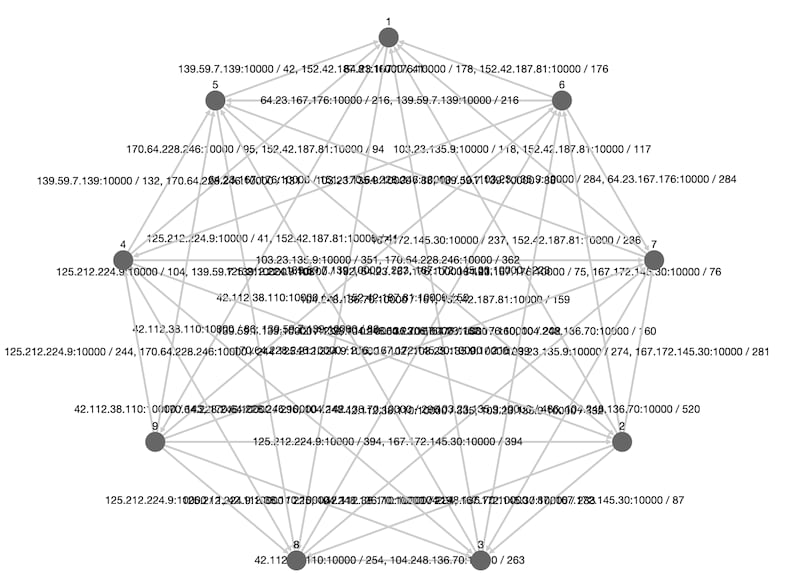20 releases
| 0.2.8 | Mar 2, 2025 |
|---|---|
| 0.2.6 | Feb 27, 2025 |
| 0.2.4 | Nov 26, 2024 |
| 0.2.2 | Jul 22, 2024 |
| 0.1.1 | Nov 23, 2023 |
#562 in Network programming
113 downloads per month
Used in 8 crates
(6 directly)
155KB
611 lines
atm0s-sdn: Global-scaled Ultra-low latency Decentralized SDN
A SAN I/O driven, open-source decentralized network infrastructure that can deliver high-quality data with minimal latency and efficient cost, similar to what Cloudflare achieves for their network.
For a deep dive into the technical aspects of network architecture, please refer to our Smart-Routing
Project Status: Alpha
This project is currently in the alpha stage of development. It is actively being developed and may undergo significant changes, including changes to the API. The primary focus at this stage is to make the project stable and reliable.
We are working with some potential partners to integrate the network in real-world scenarios. If you are interested in testing the network, feel free to contact us or sending an issues.
Features
- High availability by being fully distributed, with no central controller.
- Multi-zone support, high scalability.
- Metric based Adaptive routing: latency, bandwidth
- Network orchestration and discovery (manual mode only).
- High extendibility by using Network Service.
- Built-in features: PubSub, KeyValue ..
- Cross platform: Linux, MacOs.
Build-in features
- Router sync: automatically sync routing table between nodes for implementing Smart-Routing
- Pubsub: Publish/Subscribe
- DHT Multi-Map: Key-Value store
- Node Alias: Each node can have multiple alias
- Virtual Socket: Act as virtual UDP socket
- Network accelerator by eBPF redirect
- Authentication and Encryption
Build-in services
- Visualization: show network structure
- Manual discovery: each node can set owner tags and interested tags. each node will trying to connect to other nodes that have the interested tags.
Architecture
We split logic in to 2 parts: feature and service.
- Feature: is a high-level logic that can be used to build a network service. For example, PubSub, KeyValue, Virtual Socket ..
- Service: is a extendable logic that can be used to build a custom logic. Each service can use all other features to build a custom logic.

For better in testing and developing we split library to 2 parts:
- Network Protocol: implement in SANS-I/O style
- Runner: for integrating with SANS-I/O runtime
Getting started
Project includes some example and a standalone node, which can be used to test the network.
Build from source:
cd bin
cargo build --release
Running first seed node as a network structure collector:
cargo run -- --collector --local-tags demo --connect-tags demo --node-id 1 --udp-port 10001 --web-addr 0.0.0.0:3000
Running second nodes and join to network with seed node (you need to replace with seed node IP if it running on another device):
cargo run -- --local-tags demo --connect-tags mode --seeds 1@/ip4/127.0.0.1/udp/10001 --node-id 2 --udp-port 10002
Same with this, we can run more nodes and connect to the network. Remember change node-id and port for not conflict with other nodes.
Access to the web interface to see the network structure: http://localhost:3000

You can also enable vpn feature in each node by add --vpn flag. After that, each node will be assigned with a private with rule: 10.33.33.{node_id % 8}.
Benchmarks
Network optimizer
We run 9 nodes across Asia, Us, Europe with Digital Ocean and some local ISP in Vietnam and test the latency between each node. The result show that the network can speed up latency by maximum 48.5% compare to normal routing.
Maximum optimized:
| US | EU | ASIA | |
|---|---|---|---|
| US | 0 | ||
| EU | 3.40% | 0 | |
| ASIA | 48.5% | 28.30% | 47% |
Average optimized:
| US | EU | ASIA | |
|---|---|---|---|
| US | 0 | ||
| EU | 0.40% | 0 | |
| ASIA | 11.6% | 9.50% | 3% |
We will test more in the future to get more accurate result with more cloud provider and local ISP.
Speeds
In some fast test, it show that network node can relay around 1Gbps per core. We will test more in the future to get more accurate result.
Showcases
Contributing
The project is continuously being improved and updated. We are always looking for ways to make it better, whether that's through optimizing performance, adding new features, or fixing bugs. We welcome contributions from the community and are always looking for new ideas and suggestions. If you find it interesting or believe it could be helpful, we welcome your contributions to the codebase or consider starring the repository to show your support and motivate our team!
For more information, you can join our Discord channel
Roadmap
The first version will be released together with Media Server at the end of 2023.
Details on our roadmap can be seen TBA.
License
This project is licensed under the MIT License - see the LICENSE file for details.
Acknowledgments
We would like to thank all the contributors who have helped in making this project successful.
Dependencies
~10–38MB
~604K SLoC